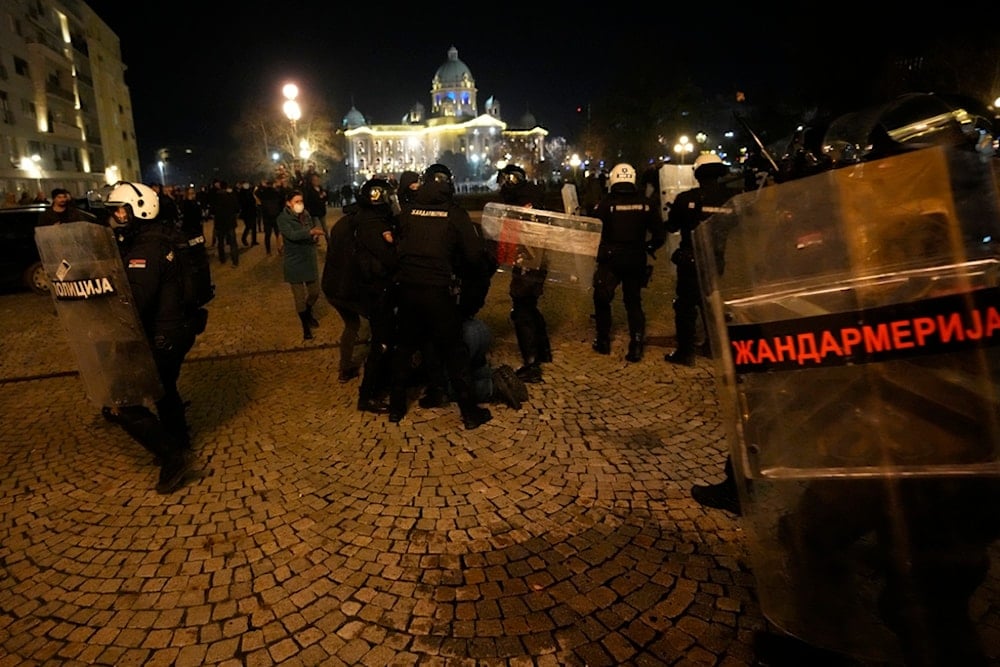Serbia's Vucic says Belgrade protests threaten country's independence
Some of the protesters climbed the steps of the National Assembly and attempted to break down the doors.
-

Protesters clash with gendarme in Belgrade, Serbia, Sunday, Dec. 24, 2023 (AP)
Serbian President Aleksandar Vucic declared on Sunday that the violent protests in Belgrade are an effort to undermine Serbia's independence and sovereignty, noting that authorities will ensure that order is preserved.
Earlier in the day, backers of the Serbian opposition, dissatisfied with the outcomes of the recent snap elections, encircled the National Assembly in the capital city of Belgrade.
They even climbed the steps and attempted to break down the doors, as reported by a correspondent from Sputnik.
Vucic said that some of the protesters have already commenced celebrating what they perceive as a "successful revolution."
"It is a product of much more serious geopolitical circumstances in which they are trying to destroy the autonomy, independence and sovereignty of the Republic of Serbia. We will preserve the freedom of Serbia, because it is the greatest value, we will preserve the autonomy, independence and sovereignty of our country," Vucic said in a special address to the citizens.
🚨 After fraudulent elections in Serbia to enable Vucic's ongoing dictatorial reign, as confirmed by a multitude of international watchdogs, people are now storming the administration building in Belgrade. pic.twitter.com/nd0VKEkH0p
— Igor Sushko (@igorsushko) December 24, 2023
Read more: Vucic tells NATO that Serbia will remain military neutral territory
The Serbian leader expressed gratitude to the intelligence services of partner countries that provided warnings to Serbian authorities about imminent unrest.
Additionally, Vucic urged citizens not to be concerned about the unrest, emphasizing that there are no discussions of a revolution.
"Do not worry, citizens of Serbia. Although the scenes are dramatic, we love our country and city, we are not used to someone breaking our home, No revolution is happening, they will not succeed in any of this," Vucic noted.
Up to 2,490 people are taking part in the protests, and the authorities are "endeavoring to employ a restrained response" to avoid causing harm to any random demonstrators, as stated by the president.
On another note, a Sputnik correspondent reported that the police deployed tear gas against a crowd of demonstrators attempting to break into the National Assembly building, which is currently barricaded from the inside with shields by the gendarmerie.
Read more: Bosnia, Serbia hold mass protests in solidarity with Palestine
It is important to recall that NATO waged a brutal aggression in the former Yugoslavia in 1999 for 78 days, which led to the disincorporation of the former republic and killed between 3,500-4,000, and injured some 10,000 others, two-thirds of which were civilians.
The alliance's aggression cost Belgrade around $100 billion in material damages.
Over the period of the aggression, the alliance dropped an estimated 15 tonnes of depleted uranium in bombs and shells, after which the country's cancer rates spiked, ranking it the first in terms of cancer in Europe.
In the first ten years following the heavy shelling, about 30,000 developed cancer, and estimations say that between 10,000-18,000 of them died.

 3 Min Read
3 Min Read








